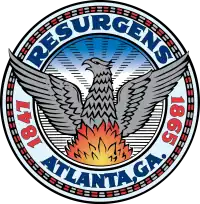James L. Key
James Lee Key (1867–1939) was a lawyer who served a total of four terms as the 45th and 48th Mayor of Atlanta.
Biography
Early years
James L. Key was born in DeKalb County, Georgia on July 27, 1867, and educated in the public schools.[1] He initially took up the practice of law in the city of Atlanta, in the 1890s
Political career
By 1902, Key was an Atlanta city councilman representing the Sixth Ward. He ran for mayor in 1904 and 1918 first losing to, then defeating, James G. Woodward. He was easily re-elected in the 1920 election. During that second term, he established Atlanta's first City Planning Commission and issued bonds to build the Spring St. viaduct (completed December 20, 1923).
He didn't run for re-election in 1922, and when he did run in 1924, he lost.
In 1930, Key was elected to a third Term in the wake of the Atlanta graft ring scandal and early in that term he made public statements against Prohibition and the blue law bans of Sunday baseball games and Sunday movies.[2] This precipitated a recall vote in 1932 that he would have lost if not for support from the black community.[3] He was instrumental in getting Harry Hopkins and his WPA program to update the city sewer system and nearly a million dollars to remodel the Atlanta Municipal Auditorium and Cyclorama building. Key won a fourth term in 1934.[2] Herbert T. Jenkins, Sr. who named a son after the mayor, was an aide and driver for Key. Jenkins later served as Chief of Police of the Atlanta Police Department for 26 years, from 1947 to 1973.[4]
By the time he was campaigning for his fifth term, against William B. Hartsfield in 1936, the nearly 70-year-old Key was accused of spending only an hour a day at his office and lost a contentious race.[5]
Death and legacy
James L. Key died in 1939 after finally seeing the end of Prohibition.
The James L. Key Elementary School was named for the late mayor in 1963. Located at the intersection of Memorial Drive and Stovall Street, the school was closed in the 1990s.[6] The former James L. Key Golf Course, in Atlanta, was named in his honor. The golf course, along with many old Victorian-era homes in the Grant Park neighborhood were demolished in the late 1950s to make way for Interstate 20.[7]
References
- "Key, James Lee (1867-1939) — also known as James L. Key". The Political Graveyard. Retrieved March 30, 2019.
- Franklin M. Garrett (1 March 2011). Atlanta and Environs: A Chronicle of Its People and Events, 1880s-1930s. University of Georgia Press. p. 921. ISBN 978-0-8203-3904-7.
- Julian Harris (March 13, 1932). "MAYOR OF ATLANTA FACES RECALL VOTE; Dry League and Wet Labor Seek Mr. Key's Removal, but for Different Reasons. SUCCESS NOT ANTICIPATED Movement Due to the Executive's Remarks About Prohibition and Action on Wages". The New York Times. Retrieved March 30, 2019.
- "James Jenkins". Gwinnett Daily Post. July 12, 2012. Retrieved March 30, 2019.
- "William B. Hartsfield 1890-1971". New Georgia Encyclopedia - University of Georgia. January 3, 2019. Retrieved March 30, 2019.
- "James L. Key School - Atlanta, Georgia". William Breman Jewish Heritage Museum. Retrieved March 30, 2019.
- Jennifer Goad Cuthbertson; Philip M. Cuthbertson (16 May 2011). Historic Grant Park. Arcadia Publishing. p. 136. ISBN 978-1-4396-2674-0.
External links
- Image: James L. Key residence (Atlanta History Center)
- Image: Mayor of Atlanta James L. Key with others beside an Eastern Air Transport plane, circa early 1930s (Georgia State University)
- 1932 press photo of James L. Key - Atlanta Mayor (Historic Images Outlet)
- Audio file: Oral history by Dr. Homer E. Nash - Recalling prominent politicians, such as Atlanta mayors James L. Key and William B. Hartsfield (Atlanta University System)
- Photo of Mayor James L. Key and Henry Ford at WSB radio in 1922
